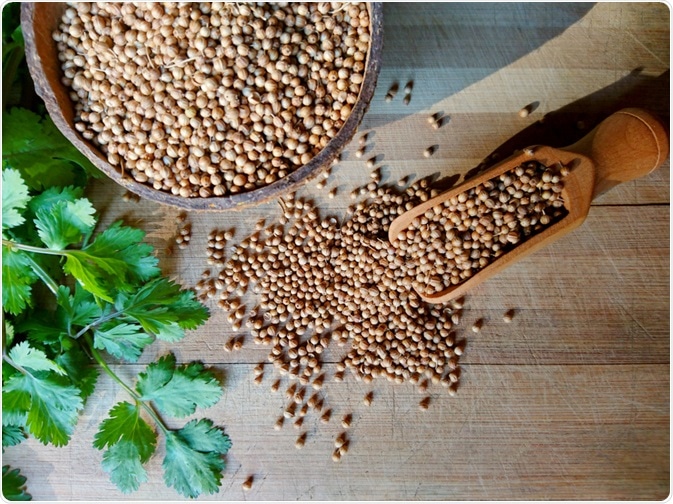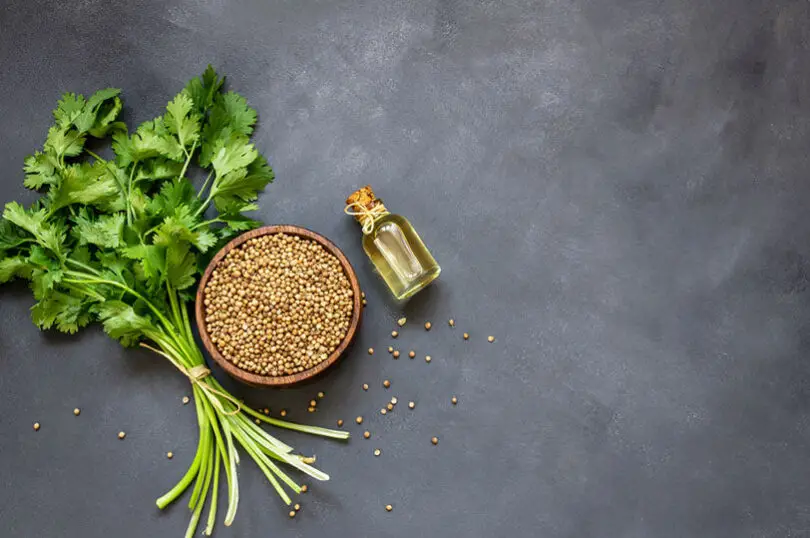Coriander smells like a combination of citrus, earthy, and slightly peppery notes. Coriander, also known as cilantro or Chinese parsley, is a versatile herb widely used in various cuisines around the world.
The smell of coriander is often described as a unique blend of citrus, earthy, and slightly peppery notes. It has a distinctive aroma that can be both refreshing and pungent, depending on personal preferences. The citrus undertones provide a bright and zesty scent, while the earthy notes add depth and complexity.
Some even perceive a subtle floral hint in the fragrance of coriander. Overall, coriander’s smell is distinct and recognizable, making it a key ingredient in many delicious dishes.

Credit: www.news-medical.net
A Brief Overview Of Coriander
Coriander, also known as cilantro, is an herb with a distinctive smell. This versatile plant has a long history and is native to the Mediterranean and Asian regions. In culinary applications, coriander is widely used in various cuisines around the world.
It adds a unique flavor to dishes, ranging from aromatic soups and stews to spicy curries and salsas. Apart from its flavor, coriander also offers numerous nutritional properties. It is rich in vitamins, minerals, and antioxidants, making it a healthy addition to your diet.
The leaves, stems, and seeds of coriander all have their own individual uses and benefits. With its aromatic fragrance and culinary versatility, coriander is an herb that continues to delight chefs and food enthusiasts alike. Whether you love it or dislike its distinct smell, coriander is undeniably a significant ingredient with a fascinating history and extensive culinary applications.
The Science Behind Coriander’S Fragrance
Coriander, also known as cilantro, emits a distinctive fragrance that is hard to miss. Its scent can be attributed to a combination of chemical compounds found in its leaves and seeds. Terpenes and aldehydes are two key contributors to coriander’s aroma.
These compounds create the pleasant and unique smell that is often described as a mix of citrus, spice, and earthiness. Additionally, the intensity and complexity of coriander’s smell can vary depending on several factors, such as the plant’s maturity, growing conditions, and harvesting techniques.
So, whether you love or loathe the scent of coriander, it’s fascinating to understand the science behind its fragrance. The chemical makeup of coriander is what gives it its distinct smell, making it an intriguing ingredient in various culinary dishes around the world.
Describing Coriander’s Fragrance
Coriander’s fragrance is an intricate combination of citrus, earthiness, and spice, with floral undertones.
Personal Experiences And Cultural Perspectives
Different individuals perceive the smell of coriander differently, influenced by their cultural backgrounds and personal experiences. It’s interesting to note that cultural preferences play a role in determining one’s perception of coriander’s aroma. Some people find it refreshing and citrusy, while others describe it as soapy or even pungent.
The divisive nature of coriander’s fragrance can spark debates and discussions among food enthusiasts. Some cuisines, like Indian and Mexican, use coriander extensively in their cooking, emphasizing its importance in their culinary traditions. This variety in perceptions and cultural preferences adds complexity to the understanding of coriander smell, making it a topic worth exploring and appreciating.
Enhancing The Aromatic Profile Of Coriander
Coriander possesses a distinct and refreshing aroma that adds depth and flavor to various dishes. Pairing it with complementary ingredients, such as citrus or cumin, can enhance its overall aromatic profile. By using coriander in oils and extracts, its smell can be extracted and preserved, allowing it to be used in a more concentrated form.
When cooking with coriander, the key is to strike a balance, ensuring that its fragrance doesn’t overpower other flavors in the dish. Whether it’s sprinkling coriander leaves in a salad or using ground coriander seeds in a curry, incorporating this aromatic herb into your cooking can elevate the overall sensory experience.
Experimenting with different techniques and combinations can help you discover the perfect way to maximize coriander’s unique smell and elevate your culinary creations.
Coriander In Perfumery And Fragrance Industry
Coriander has an intriguing aroma that is widely utilized in the perfume and fragrance industry. Its unique scent is often incorporated as a top, middle, or base note in various perfumes. Many renowned fragrances feature coriander prominently, adding a distinct and refreshing touch to the overall composition.
Its role in fragrance creation is highly valued for its ability to enhance and balance different scents. Whether it is used as a subtle accent or a dominant ingredient, coriander brings a captivating essence to perfumes. Its fragrance is versatile and can be combined with a wide range of other notes to create unique olfactory experiences.
With its distinct smell, coriander adds a touch of sophistication to the world of perfumery.
Discovering Coriander Fragrances Around The World
Coriander’s fragrance is a familiar scent in various cultures worldwide. Its uses in perfumes, both traditional and modern, are diverse. From its cultivation regions come coriander-scented products that stand out. Each area has its unique take on coriander fragrances, making the exploration all the more intriguing.
The scent of coriander is distinct and recognized worldwide, offering a delightful sensory experience. Whether in perfumes or other scented products, coriander aromas continue to captivate people’s senses. The fragrance provides a versatile and refreshing addition to various fragrance blends, attracting both enthusiasts and admirers.
Discovering the many fragrant facets of coriander is an exciting journey that unveils the diverse beauty of this aromatic herb.
Exploring Coriander’s Therapeutic Aromatherapy Benefits
Coriander possesses an intriguing scent that is often described as citrusy and herbaceous. It is utilized in aromatherapy and essential oils to unlock its therapeutic benefits. One notable advantage of coriander is its potential to relieve stress, allowing individuals to find solace and tranquility.
By incorporating coriander into their routines, individuals can promote relaxation and mindfulness in their daily lives. The use of coriander in aromatherapy has been praised for its ability to ease anxiety and tension, creating a sense of calm. This versatile herb not only enhances the scent of various products but also offers an aromatic journey that rejuvenates and revitalizes the senses.
Exploring the therapeutic aromatherapy benefits of coriander showcases the vast array of advantages it has to offer, making it a valuable addition to any relaxation routine.
Frequently Asked Questions
What Perfume Smells Like Coriander?
Perfumes with coriander notes include Tom Ford’s Black Orchid and Maison Francis Kurkdjian’s Aqua Celestia Forte.
Does Coriander Have A Strong Smell?
Yes, coriander has a strong smell.
What Is The Smell Of Coriander Due To?
The smell of coriander is due to specific compounds called aldehydes and ketones.
Is Cilantro The Same As Coriander?
Cilantro and coriander are the same herbs, just with different names in different countries.
Conclusion
The smell of coriander is a unique and distinct combination of citrusy, floral, and earthy notes. Its fresh and fragrant aroma can be described as a delightful blend of lemon, parsley, and hints of mint. Although some people may find coriander’s scent overpowering or soapy, others appreciate its refreshing and invigorating qualities.
Coriander’s aroma not only enhances the taste of various cuisines but also provides a sensory experience that can elevate dishes to a whole new level. Whether you’re adding it to salsa, curry, or a garnish for a salad, its fragrance will transport you to a world of vibrant flavors.
Understanding the smell of coriander is crucial not just for cooking enthusiasts and chefs, but also for those who are curious about the world of spices and herbs. By being able to recognize coriander by its distinct scent, you can confidently explore new recipes and bring a touch of excitement to your culinary adventures.
So, next time you come across coriander, take a moment to savor its remarkable aroma and appreciate the unique sensory experience it brings to your culinary creations.








